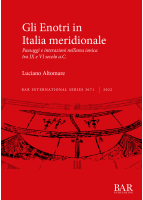Description
Questo lavoro si propone di portare l'attenzione sul caso studio di un paesaggio culturale antico segnato dal fenomeno coloniale, in cui è avvenuta l'interazione tra due grandi e diverse componenti etniche. Ad essere preso in esame è il territorio degli Enotri, in gran parte coincidente con le aree di influenza delle colonie achee di Crotone, Sibari e Metaponto e della ionica Siris, per comprendere entro quali dinamiche si è verificato il contatto tra gli indigeni e i Greci al momento delle fondazioni. L’obiettivo del lavoro è quello di tracciare la natura e le caratteristiche del popolamento enotrio e le trasformazioni avvenute dopo le fondazioni greche. In antitesi alle tendenze primitiviste e diffusioniste che si appiattiscono nella considerazione esclusiva dell'elemento coloniale, questa ricerca ha tentato di riconoscere il ruolo, troppo spesso marginalizzato, svolto dagli indigeni nella definizione politico-culturale della Magna Grecia.
This work presents a case study of an ancient cultural landscape marked by colonization in which interaction between two large and different ethnic groups took place. The purpose of the work is to trace the nature and characteristics of the Oenotrian population and the changes that occurred after the arrival of the Greeks. The territory of the Oenotrians (largely coinciding with the Achaean colonies of Crotone, Sibari, Metaponto and Ionian Siris) is examined in order to understand how contact between indigenous peoples and Greeks took place at the time. In opposition to the primitivist and diffusionist interpretations that ignore colonial elements, this research enhances the role, too often marginalized, played by indigenous peoples in the political-cultural creation of Magna Graecia.
AUTHOR
Luciano Altomare è professore a contratto di Archeologia dell’Italia preromana presso il Dipartimento di Studi Umanistici dell’Università della Calabria. Ha lavorato in numerosi scavi archeologici in Italia centro-meridionale. Le sue pubblicazioni scientifiche includono ricerche sulle necropoli preromane, rapporti di scavi archeologici, studi sul mondo indigeno della Magna Grecia.
Luciano Altomare is adjunct professor of Archeologia dell’Italia preromana at the Dipartimento di Studi Umanistici of the Università della Calabria. He has worked on many archaeological excavations in central and southern Italy. His scientific publications include research on pre-Roman necropolis, excavation reports, and studies about the indigenous world of Magna Graecia.
REVIEWS
‘It is a very welcome contribution in a specialized field written by an author who both masters the specialized problems and possesses the necessary geographical and archaeological knowledge to turn valid observations into a new historical perspective. The work refreshingly demonstrates mastery of the many theoretical insights on colonization and ethnicity that play a role in the reconstruction of the early urbanization of southern Italy.’ Professor Emerita Marianne Kleibrink, Rijksuniversiteit Groningen
‘One of the key innovative elements of the book is that it deals with the archaeology of the region without subscribing to the traditional dichotomy between Greek and non-Greek remains and sites. Such an approach is essential to an understanding of the context that is not rooted in colonialist beliefs about the supposed exceptionality and superiority of Greek culture. Altomare consciously produces a bottom-up picture that looks at the evidence first and draws broader cultural inferences next.’ Professor Nicola Terrenato, University of Michigan











